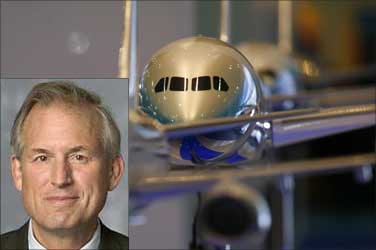
It is refreshing to meet the head of a global corporate giant who speaks candidly, including about his rivals. W James (Jim) McNerney, Jr, chairman, president and chief executive officer of The Boeing Company, does that and more.
He declares that in a year or two Boeing will overtake Airbus to regain the number one position in commercial aerospace, which it ceded seven years ago. The centerpiece of his strategy is the emerging markets, especially India.
He is looking to use the country's intellectual capability to Boeing's advantage, as seen in an agreement signed with a university on the day he spoke at length to Business Standard.
McNerney, chairman of US President Barack Obama's exports council, was in India to meet Prime Minister Manmohan Singh as part of his efforts to understand how India-US relations have evolved in the post-Bush era. He goes back reassured, but vigilant. Excerpts:
How was your meeting with the prime minister?
It was good. I talked of our deepening commitment and engagement here, that I appreciate the many partnerships that we have been able to have here as we have now been able to link India more into our global technology delivery, and thanked him for the climate that he has created between the United States and India, and the deepening ties, especially in the defence business, which have positively impacted Boeing's business. Click on NEXT to read more...
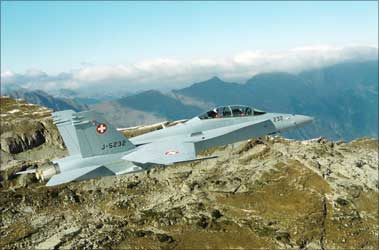
One of the things the prime minister said when he met President Obama in Washington was that the high-technology export controls, many of them still in place, were impeding business, especially in your area. Did you discuss that?
I think both sides have acknowledged that this is an issue at many levels. Our president has committed to driving export facilitation, particularly on the defence side. I think he will be reaching out to some industry leadership to help think this through and he has asked me to help think about this.
But it is in many respects about the bureaucracy in the state department. At the top level everyone is committed. The congressional oversight also has to facilitate it.
What is the progress with the F18 fighter planes you want to sell to the Indian Air Force?
The defence market here has opened up for American firms and I think we have been fortunate to have some early engagement. We are having some discussions about border patrol planes and airlift requirements. The fighters are down the road a little and we are in the middle of that competition.
Of course we would like to win it, but I believe there are five competitors. I am very impressed with the MoD's (ministry of defence's) approach here. I think it is transparent, very rigorous, and I feel it will be a fair and open competition. That is a good feeling to have, especially when you think you have the best fighter (laughs).
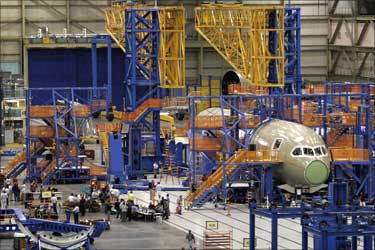
How does doing business with India compare with doing business with China, though I believe you do not deal in defence with China?
We do not have any defence engagement with China. That is a government-to-government issue. But we do big commercial business with both the countries. It is interesting because India represents the two extremes. India has a government-owned entity and it is very much a transaction with the airline as well as the ministry.
On the other side, there are eight or nine independent airlines that are commercial and privately financed. So you deal with both sides. China is something in the middle. Every airline has some government influence, but is a little more independent.
Which is easier? Dealing with governments or private entities, which try to extract the last penny out of you?
(Laughs) Governments can do a pretty good job of extracting the last penny. I don't think it is either-or. It is about making sure your company can do both well.
The defence offsets policy is a key thing in India. Does it make commercial sense for you?
It does for Boeing because it helps build global capability coming out of India and that is in our best interest. There is strong technical capability here, and low cost. It also has the benefit of continuing to develop aerospace in India.
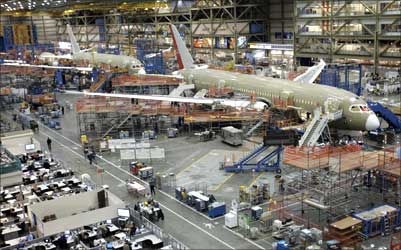
There is this talk about joint production in India and China...
In some cases, the systems we develop can be joint efforts. They can be done locally with the original design and original platform coming from the US. But, not in every case. It is dependent on the system. That is a discussion in the fighter campaign and we are open to that.
We have a deep relationship of over 20 years with HAL (state-owned Hindustan Aeronautics Ltd) about a number of systems and structures.
We have a good partner for the extent to which we need to do some localisation of assembly, or final systems testing and certification. The intent is to localise the production of the plane over time. We want to work with the Indians to make that happen.
You also have a partner in a Tata Motors subsidiary. Are you taking on more partners? Is more work being localised?
There isn't a company in India with aerospace capability with which we are not working. A couple of companies are providing software and structures for the 787, our new airplane (also called the Dreamliner).
Do you still do more local manufacturing in China than in India?
We do not do final assembly in either. It is sort of the same level of engagement in both countries.
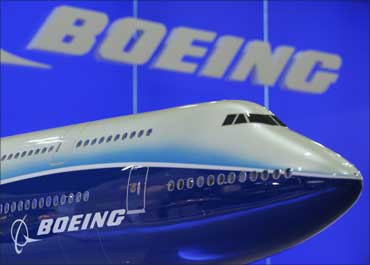
It seems Boeing is also looking at India for research and development. You have opened an R&D centre in Bangalore. Do you see more R&D moving to India from other parts of the world?
The answer is yes. We, like many large American companies, have significant IT outsourcing. We are deepening this.
The Bangalore centre you mentioned will grow over time. We have also got some other linkages into universities and the government. If I can be vague, we are working on some other linkages with universities. We signed an MoU with a university today, but that is not public yet.
There is a lot of talent here, but it is still early days for fully integrated aerospace applications. This is an example of offset obligation that will benefit us, as well as the companies and entities we are working with.
While staying vague on this subject, what role can universities play?
They provide a significant amount of talent. In an incubator setting, for example, and this would be a typical approach we are thinking of, we can engage other companies and some university capability wrapped in an aerospace theme. The academia can engage with businesses to address aerospace problems.
As you know, Business Standard is a great place to make such announcements.
(Laughs) Sorry for being so cryptic. This would definitely increase over time. There is so much engineering talent here. It just has to get conversant with aerospace applications.

When is the MRO at Nagpur coming up?
We are building it as part of the deal with Air India.
Does it make commercial sense for you?
Whether it makes commercial sense or not, Air India will get its MRO.
How do you look at the competition in India in comparison with the competition in other markets?
India as a market is broader than most, with eight or nine major customers and the defence business which is now open.
We try to present ourselves as one Boeing here - one face to both government and commercial customers. You want to make it simpler. The local science and technical capability adds a new dimension. It excites me. We want to pull more technology out of India by using the brains here.
What about the nature of competition?
Our competition tends to be narrower, approaches markets based on narrower stands. They don't have the same kind of overall weight we do.
We want to be broader and more local. We have a chance to be significantly deeper. Whether we are successful or not, we will find out.
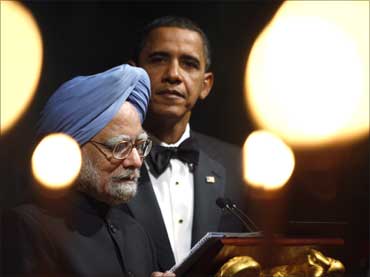
US companies face a lack of historical experience. Our defence guys have dealt with the Russians, not the Americans. They worry how reliable the US is as a supplier.
I don't deny it. They are not used to dealing with us as they are with our competitors, especially the Russians. I think our export controls can be facilitated and improved .
I do understand the concern about the predictability, and the ultimate capability they can get on any platform. I understand and will spend a fair amount of time to improve those processes, so they won't feel that way.
The problem is not so much with your company as with your government.
It is a question of working with our Congress and the executive branch of our government to facilitate it. President Obama has committed to the PM that he will improve these processes to make them more reliable. It does present competitive issues with other offers. It is a fair criticism.
We have to roll up our sleeves and work with our government and legislature. President Obama is trying to set that tone right now in the United States. His leadership will be important.
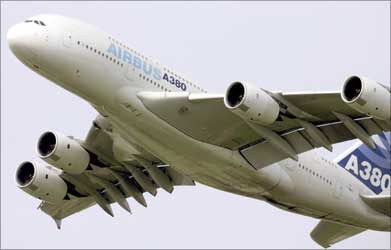
In 2003, EADS overtook Boeing on the commercial side. The A380 of Airbus has created the most buzz in the industry. Boeing seems to be playing catch-up. Do you see yourself regaining the number one position?
First, let us get our facts right. We are, by far, the largest aerospace company in the world. About the commercial part of our business, you are right, it is Airbus. Based on the growth of the 787 and 777, we anticipate overtaking them over the next year or two.
The growth of the 787 is by far the most successful introduction of an airplane in history. We have 876 orders from 56 customers around the world and we have not delivered the plane yet. This is a huge innovation and a huge hit and there is maybe a little more buzz in the industry about the 787 than the A380.
Sorry, I am being defensive. I feel very good about our wide-body strategy. I feel very comfortable with the competitiveness of our airplanes - the 787 and 777 - when compared to the A380, A340 and the A330, and my guess is that we have a good chance of overtaking Airbus and we would be driven by these wide-body airplanes. Also, they will have to respond to us.
Last year, things slowed down a bit and airlines found it a problem to raise finance. How do you feel about cancellation of orders?
The financial situation has affected some airlines more than the others. But, we have felt no impact. We have faced no cancellation in India.
Our competitor has faced a little more difficulty there. I'm being a little immodest, but I think we chose our partners wisely.
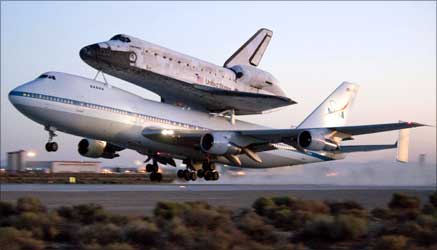
In all these deals you strike globally, especially for defence, it seems politics plays an important role. What is Boeing's philosophy in managing politics?
The first thing we try to do is to win the competition as if there were no politics. I don't want my team to rely on politics. We are going to win because we have the best airplanes, the best systems and the best support and trust from our customers. You are right, politics can play a role.
The overall climate, for one. In the Indian situation everything changed because of what Manmohan singh and George Bush did. The civil nuclear deal embodies it, but the climate totally changed.
That created a level playing field for us and now we can compete. We can't control politics. We try to understand it. We try to make sure that everyone in the political environment understands why we should be the winner. We try to adapt to the politics and be responsive to it.
Are you worried now that President Bush is gone? Do you think the warmth in Indo-US relations is gone?
It is one of the things I wanted to find out when I came here. I have been asking everyone this question, trying to assess the relationship. But, the sum total of our discussions here and back in Washington is that there has not been a slowdown in momentum.
Issues with Pakistan crop up because of the different angles we have - us with terrorism and you with the historical relationship. The momentum has been maintained, even though there have been some difficulties.
President Obama tried to send every signal he could that the civil nuclear agreement and other agreements will be a major priority. He has tried to reassure the Indians.
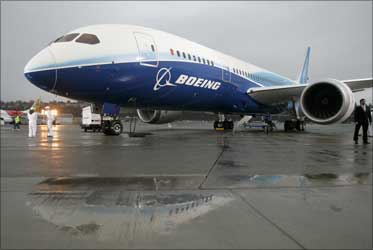
Do you go back reassured?
Yes, I would say so, but we have to be vigilant. This is a new relationship and until we get to know each other better, little things can seem to be out of proportion. But, the mutual self interest is real and that is what keeps us together. The world is a safer place because of US' relationship with India.
No discussion is complete without a direct comparison between China and India. How do you see the two markets evolving?
They are both fast-developing markets. The Indian economy is a little narrower but deeper, with IT and knowledge-based industries. It is not as strong in manufacturing, but is rapidly improving.
But, China has more manufacturing capability. I never see China and India as either-or. They will both be huge winners.
The political challenges will be more a problem to surmount than the economic ones. I don't think it will matter which one will be bigger.
How much a dream is the Dreamliner?
Did you think of that question all night... (laughs)? About the Dreamliner, the thing we got right is that we came up with the right product, made of the right materials, involving the right technologies and it is a huge winner.
What we did wrong is that we overestimated our ability to develop it as quickly as we promised. That involved the global supply chain. We went a bridge too far with some of our partnerships.
The technology, particularly the composites technology which the plane is made of, had not settled down yet. We needed to re-engineer some things. It feels good to move from the bleeding edge to the leading edge.
Did you think of that line all of last night?
(Laughs)... I have used that line before. We are in tests right now. We have three planes in the air. We will soon have six.
It is becoming a reality. We have no major glitches. We are keeping our fingers crossed that nothing major will crop up and we will see our first deliveries this year.